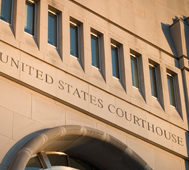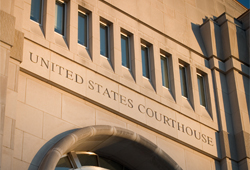 As we have previously reported, Regeneron’s BPCIA case against Mylan regarding Mylan’s proposed aflibercept biosimilar is proceeding in the U.S. District Court for the Northern District of West Virginia, with a two-week trial scheduled to begin on June 12, 2023. On May 23, 2023, Amgen filed a motion to intervene in the case “for the limited purpose of invoking the First Amendment and common law rights of public access to judicial records in order to unseal documents that were previously sealed.” As we have previously reported, and as Amgen’s supporting brief confirms, Amgen is developing its own biosimilar candidate to Eylea known as “ABP 938.”
As we have previously reported, Regeneron’s BPCIA case against Mylan regarding Mylan’s proposed aflibercept biosimilar is proceeding in the U.S. District Court for the Northern District of West Virginia, with a two-week trial scheduled to begin on June 12, 2023. On May 23, 2023, Amgen filed a motion to intervene in the case “for the limited purpose of invoking the First Amendment and common law rights of public access to judicial records in order to unseal documents that were previously sealed.” As we have previously reported, and as Amgen’s supporting brief confirms, Amgen is developing its own biosimilar candidate to Eylea known as “ABP 938.”
In its recent filings, Amgen criticized Regeneron and Mylan’s “sealing practices” in the litigation, and stated that “the parties have filed numerous documents under seal” but that “for the most part, the docket sheet does not list motions to seal with titles explaining what documents the party seeks to seal and the public cannot access the actual motions or pleadings.” Amgen also identifies 63 missing docket number representing motions or pleadings that are absent from the publicly-accessible docket sheet. Amgen further states that because many of the orders granting motions to seal are also sealed, “no determination can be made as to what was sealed or the justification for sealing it.”
Amgen argued that the “extensive sealing” in the litigation violates the public’s right of access to court proceedings and documents filed with the court under the First Amendment and U.S. common law. Amgen also argued that the public was not given an opportunity to object to the sealing of documents, and that insufficient explanation was provided for why sealing of documents was necessary and why less-extreme alternatives to sealing documents, such as partial redaction, were rejected.
Amgen then made several requests of the court, including that it (1) order that particular documents, including “all summary judgment, claim construction, and inequitable conduct motions [and] briefs,” or redacted versions of them, be filed publicly, (2) add to the public docket sheet all previously filed motions to seal and orders granting them; (3) re-review the extent of sealing in the case in view of the public’s rights under the First Amendment and common law and provide the public access to the reasons for sealing; and (4) ensure that the public has in person or remote access to the upcoming trial.

